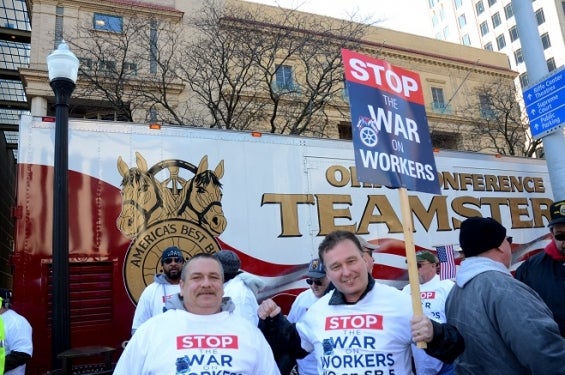Headline News
Teamsters: Workers, Not the Rich, Need a Hand Up

The growing disparity in incomes between the “haves” and the “have nots” is a real problem for America, and one that is being felt in many corners of this country. And it is an issue policymakers are going to have to get a handle on if they want to ensure the U.S. retains the values that have made this nation great.
It may not surprise some people to discover that thriving cities such as New York, San Francisco, Boston, Washington and Seattle are experiencing a growing divide when it comes to income as home prices and rents soar there. But reports also show it is a problem in less obviously places and has been for decades. In fact, in four states – Alaska, Michigan, Nevada and Wyoming – all of the income gains between 1979 and 2007 went to those in the top one percent, while the rest saw incomes drop.
In another 15 states, the top one percent captured between half and 84 percent of all income growth during that same time. Those states are Arizona, Oregon, New Mexico, Hawaii, Florida, New York, Illinois, Connecticut, California, Washington, Texas, Montana, Utah, South Carolina and West Virginia.
“The lopsided growth in U.S. incomes observed between 1979 and 2007 resulted in a rise in every state in the top 1 percent’s share of income,” the report stated. “This rise in income inequality represents a sharp reversal of the patterns of income growth that prevailed in the half century following the beginning of the Great Depression; the share of income held by the top 1 percent declined in every state but one between 1928 and 1979.”
Given this, you would think that lawmakers at all levels would be looking for a way to reverse the trend. But the stats just don’t back that up. In fact, it is the nation’s largest corporations who have and continued to receive big handouts. A new report by taxpayer watchdog Good Jobs First shows three quarters of all economic development dollars awarded and disclosed by state and local governments went to 965 large companies. That adds up to $110 billion in all. Even the company owned by the anti-government Koch Brothers got into the act, taking in some $88 million in government handouts.
Some cities seem to be realizing the error of their ways and are now reaching out to regular people. Initiatives in places such as Boston, Philadelphia, Pittsburgh, Washington and elsewhere are trying to keep homeowners in the neighborhoods where they have lived for years instead of being priced out by escalating real estate taxes. It’s a small step, but meaningful just the same. Those who have lived and worked in cities through the bad times shouldn’t be kicked to the curb when the good times come.
Still, there is more to be done. Congress has allowed food stamp and long-term unemployment benefits to lapse. Lawmakers can’t continue to turn their back on hard-working Americans while embracing the most fortunate. It’s not good policy and is not the principles on which this country was built.